Karaköl – Depressed Life
I arrived in Karaköl by accident. At first I planned to go from Osh to Toktogul by a direct bus. Toktogul is located on the midway going to Bishkek. But I missed the bus. The jouney then turned to be quite exhausting, as I had to take first the bus to Jalalabad for 100 Som, then 90 Som from Jalalabad to Tashkomur. I arrived in Tashkomur almost dark.
Tashkomur is famous for its electrical generator produced by the dams. The town is also a sad witness of the deterioration of Kyrgyzstan economy after the independence. Now it is a quiet sleepy town 2 km away from Osh-Bishkek highway.
It was not the place I really want to spend a night. I was lucky when suddenly came a bus signed “Toktogul”. I jumped in, wishing to see my old friends in Toktogul on the very same day.
After two hour journey (100 som), the crowded minibus suddenly emptied in the middle of the town of Karaköl. It was complete dark already. The bus didn’t continue any further. It just stopped in Karaköl, and that was all of the journey today.
I felt lost. In the middle of night, in a town notorious for its poverty and crime.
Suddenly a lady came to me. She was th lady whose young son asked water from me. The lady traveled in the same bus since Tashkomur together with a girl, a small boy, and a girl-baby. It was difficult time for her as the baby never stopped crying.
“Where are you going?” asked her.
“Toktogul,” I answered.
“Don’t worry. There are many cars going to Toktogul. We will try to find for you,” the lady asked the girl to enquire the taxi drivers near the bus stop. But none were going to Toktogul. There wouldn’t be any bus either, as it was late.
There was no choice, I had to stay here. I counted my money in my wallet. It was no more than 1000 som (25 dollars) and I still had to survive with this money until I arrive in Bishkek where I can change some more soms.
“Come to our house,” said the lady, friendly.
“But I don’t have money,” I said.
“Don’t worry. We don’t want your money.”
I grated her.
I followed them. We walked along the main road. It was dark, and my eyes were covered by nervous of what would happen. It was a big wooden house, old and gloomy. There were some doors. The lady knocked one of the doors and another old lady appeared. They all talked in Kyrgyz which I understood nothing. The lady got the key and then went to her own door. She invited me in.
Her house was small. The floor was wooden, the wall was dirty. The bulb was gloomy. And there was certain smell filling the air, which I presumed came from a toilet that never been flushed by water.
She invited me to a room. We all sat there, and here I started to know who they were. We sat on the floor. A table cloth was laid on the floor surrounded by sitting mattress (kurpacha) where we sat on. The girl was busy of boiling water, for tea. Now was dinner time, but they didn’t cook. It is because they had nothing to cook.
The lady, Gulsaira, was a 45 year old lady, unemployed. Her husband had long died. She had to raise her daughter by herself. The daughter, Guldora, 16, was the beautiful, tall, Kyrgyz girl who now was boiling the water as well as playing with the little baby.
The little boy and little baby, whom Guldora referred as her brother and sister, in fact were not her own. It was strange for a 16 year old girl to still have a baby sister, wasn’t it? Gulsaira told me, he picked Eldiyar, the 5 year old boy now, when he was a baby in front of the house’s door. She didn’t know who Eldiyar’s real parents were, or actually she knew but preferred to keep it secret. The parents threw Eldiyar little baby in front of the door and poor Gulsaira couldn’t help to see the poor baby crying. She was poor but her heart was not. She picked the baby and raised his as her own son – now the naughty boy, Eldiyar. Eldiyar didn’t know his own history yet, and Gulsaira wouldn’t tell him in the near future.
“He is too young, it is still not the time,” said her.
Eldiyar was terribly naughty. The boy cried loud when he didn’t receive what he asked for. He might throw away the bread, spill the tea of others and spoil anything he could reach. His teeth was all broken and black because of candies. But he couldn’t resist the temptation. Gulsaira called his naughty boy as ‘satan boy’, but I knew it was merely a nickname. She loved Eldiyar nevertheless.
Gulsaira was poor. She had no work as most of people in Karaköl were. But she had a very big heart . Not only accommodating and feeding a complete stranger like me in her poor little house, she also raised two children not of her own. Oh ya, I forgot about the little baby, now happily ate the smashed apple. She was the baby of Gulsaira’s brother, whose wife just passed away in an accident.
This baby spoke nothing but ‘papa’ and ‘mama’. She already knew that Gulsaira was not her own mother. When she was shown the photo of her real parents, she cried happily, “papa…., papa…, mama…., mama….”
The baby loved Gulsaira very much. She just learned to walk and her Mecca was always Gulsaira’s hands.
Gulsaira was hospitable. She also invited her neighbors to join the dinner. But what was the dinner?
The family, as I said before, had nothing to cook. But they had a mountain of old breads, little candies, halves of chocolates, some rotten fruits, tea without sugar, hmmm…. What else? Maybe the list should indeed stop here. Yes, that was all.
This was common menu for snack time in Central Asia, or simple breakfast. But for Gulsaira family (and two neighbors joining the dinner, plus me), it was the main dish.
“This is dinner of the poor, what else we can eat but this?” Gulsaira asked rhetorically.
The answer was none. I also shared some of the candies I got from my friend’s house in Osh, which Eldiyar finished just in blinks of eyes. The family then ended the simple dinner, with a deep grateful to God.
Life in Karaköl had changed to be very bad since the independence of Kyrgyzstan. This small country, whose first president was so liberal and immediately changed the direction from socialist to be world capitalist, had to suffer and realized that it had not enough resource to offer the greedy capitalist world. The economy collapsed. Karaköl use to live on Toktogul Hydroelectric Station (GES) but the country couldn’t sustain anymore the industry as what it was. Most of the population of Karaköl left unemployed, and frustration was the word to describe the life now.
Gulsaira told me a story of a poor girl whom she take care of. The parents were heavy drunks. When frustration came, vodka was always the answer, an easy way out. Both of the father and mother were unemployed. Life changed to be bitter. They became beggar, but as almost everybody got poor, being beggars was also of no use. The father also turned to be criminal and a gamble devil. All of the money was for vodka.
So was the mother. The mother also was a heavy drunk when she got pregnant. The first son was a healthy son, born before the Kyrgyzstan’s independence. The daughter, suffered too much alcohol since in her mom’s womb, born as an idiot. The girl now was 9 years old. One night the mother and father, both drunk, were fighting in their home. For unknown reason (as nobody understood the logic of the drunks), the drunk mother reached the bulb with her bare hands. She was electrolyzed together with vodka in her mouth. She was found died the next morning. The drunk father continued his normal life as a drunk-cum-beggar-cum-criminal. And it was Gulsaira now who took care of the idiot girl of the family. Gulsaira was not religious. She didn’t pray. But she knew hat vodka was the mother of all evils.
Story like this was so common among the witness of frustration in Karaköl. Nobody was homeless but not many were happy.
I spent the night sleeping in the same room with all of the people in the family. It was crowded, but they tried their best to arrange the most comfortable place for me. Gulsaira’s young baby stopped crying and fell asleep fast. Eldiyar was more tricky. The next day I left to Toktogul and was so thankful to learn precious lessons from the frustrated Karaköl.

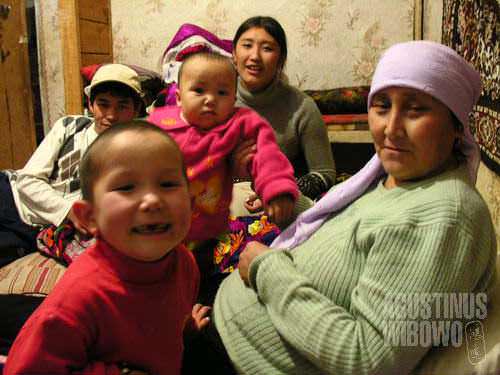
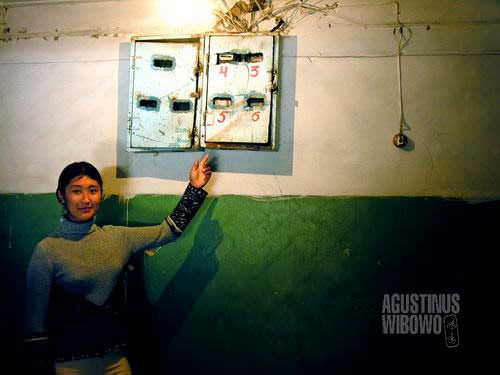
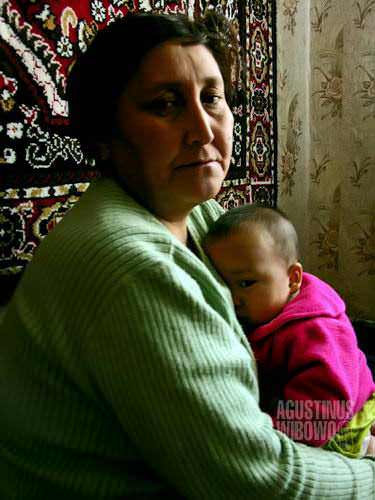
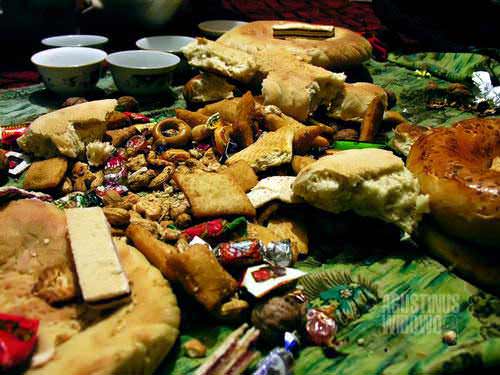
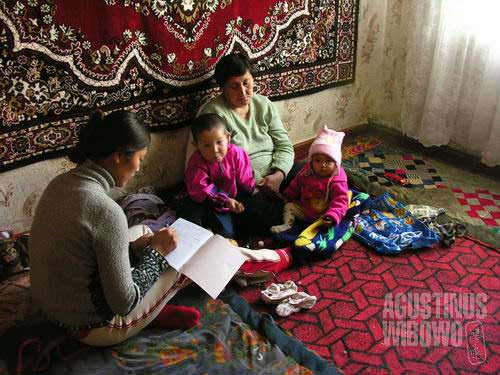
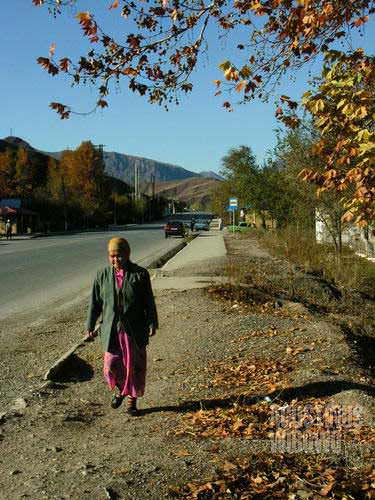

Leave a comment